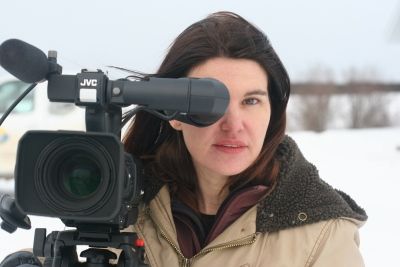
Attendees from Canada’s 17 law schools coming to Queen’s Law for the Kawaskimhon Moot on March 11 are already participating in one of the most unique events available to law students.
This year, however, moot organizer Hugo Choquette, Law’05, LLM’10, has arranged for some extra-curricular activities to make the moot an event to remember.
Key among them is the screening of Third World Canada, a documentary by Ottawa filmmaker Andrée Cazabon. Completed in 2010, the documentary brings to light the living conditions of some of Canada’s Aboriginal peoples, and is part of a broader educational platform on indigenous rights and reconciliation that Cazabon is developing.
The director will be screening the movie for moot attendees, and special guests including Dean Bill Flanagan and Queen’s Law Aboriginal Ambassador David Sharpe, Law’95.
In the wake of the Truth & Reconciliation Committee, Cazabon finds that the documentary is more timely than ever. “This screening is an opportunity to have a dialogue on reconciliation, on truth-telling,” she says. “I’m hoping it opens up a dialogue on the 94 Calls to Actions of the Truth and Reconciliation Commission and about justice for indigenous communities.”
As Cazabon explains, the documentary also shows a different side of justice in indigenous communities than one that’s often assumed. “I also hope it will be a celebration of indigenous people, and show that justice isn’t just a concept that applies to our negative perceptions of indigenous issues, like crime. We need to celebrate indigenous approaches and contributions to justice through their own law systems and sophisticated diplomatic protocols that have influenced our own Canadian understanding of justice and International law. In the discussion after the film I hope to raise awareness of partnerships we have, such as treaties,” she says.
The documentary, two years in the making, was filmed in Kitchenuhmaykoosib Inninuwug – a north-western First Nations remote reserve visited by Flanagan and Sharpe as part of a reconciliation trip in the summer of 2015. Cazabon had met Dean Flanagan prior to that trip, and learned more of his and Sharpe’s commitment to indigenous issues throughout. “I continue to be impressed by Dean Flanagan’s level of commitment,” she says, “and I want to create a partnership or collaboration with Queen’s Law in terms of reconciliation education.” Cazabon also sat in on a class given by moot organizer Hugo Choquette in January, establishing what a “great fit” her work might be at Queen’s Law.
Other Queen’s University resources and connections have shaped her work as well. “I have to mention the support of Four Directions at Queen’s,” she says. “I’ve made repeated visits there to consult, to learn, but also to celebrate. They bring so much to daily life at Queen’s University.”
Ultimately Cazabon hopes that the screening will not only inform and spark dialogue, but also humanize issues that are often seen in the abstract. Third World Canada was primarily funded by the Law Foundation of Ontario with a mandate to educate. But it’s also very moving story,” she explains. “We often think of First Nations issues, but very rarely are we exposed to First Nations people; the Chief who is also living bare-bones to support his grandchildren, an aunt pursuing a university education while taking on her five of her orphaned nephews and nieces… looking at these human challenges we have to take on together.”
Third World Canada follows the story of eight children orphaned by the suicide of their parents in a remote First Nations community and will be screened at 7 p.m. on Friday, March 11 in Macdonald Hall on the Queen’s campus.